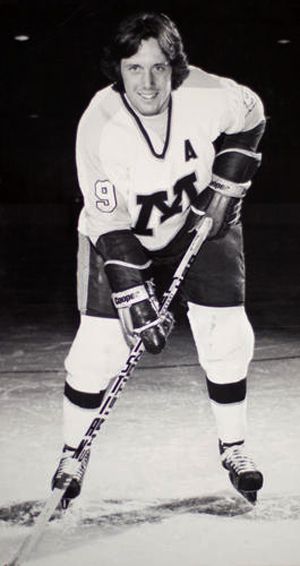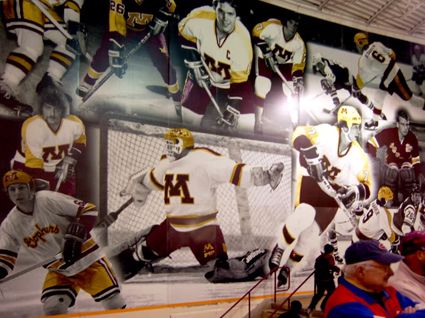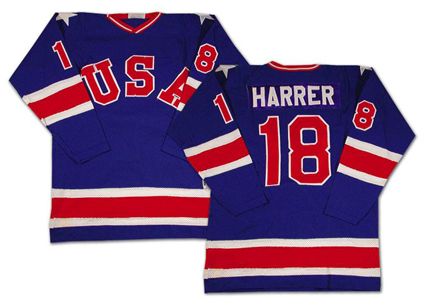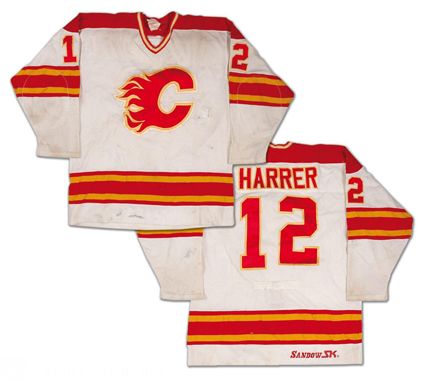Brooks kept searching, and when Eruzione hit his drought, he found a willing pair of freshman forwards: Tim Harrer and Aaron Broten from the U. Brooks had recruited both of them, and both were players with speed and skill and explosive scoring ability. Brooks's plan was to tell the press that Eruzione had injured his back, then make his erstwhile captain an assistant coach; that way he could still be in Lake Placid and contribute to the team. When the coach laid out this scenario to Eruzione, the captain was aghast. Making the Olympic team meant everything to him. In the fall, he had fractured his wrist one day in a collision with Eric Strobel, then fainted in the van as trainer Gary Smith drove him to the hospital for X-rays, not so much from the pain of the fracture as from the prospect of it costing him his roster spot. Now he was on the brink again, and for once this was no Brooksian mind game. In a hotel lobby in St. Paul, before a team dinner in late January, Brooks had a private conversation with Gus Hendrickson, his friend and the coach of Minnesota-Duluth."I'm going to cut Eruzione. He's just not very good," Brooks said. "I think I'm going to go with Tim Harrer.""But Eruzione's your leader. You need a leader," Hendrickson said. "Herbie, don't start screwing things up now." It was exactly the sentiment of the team. They'd been through Brooks's boot-camp grind for six months. Eruzione had become a widely admired captain, an emotional linchpin."If he cuts Eruzione, we're not going to go," John Harrington told Hendrickson, his former coach.The players on the team were furious when Harrer and Broten arrived -- even the Gopher guys who knew and liked them. "Great to see you, Tim," [Steve] Janaszak said to Harrer. "When's your flight back?" Not even three weeks before Opening Ceremonies, the team confronted Brooks about his revolving door and had a four-letter suggestion for him: stop. It wasn't fair to bring in guys so late, to send guys packing who had been making sacrifices for months. Of course the imports might stand out during their audition; they hadn't spent months getting beaten up by Central Hockey League thugs looking to make a name for themselves by working over an Olympic kid. Led by Eruzione and O'Callahan, the players told Brooks that they were a family and that the team needed to come from the guys in the room right there. Brooks for once backed off.
Tuesday, May 10, 2016
1980 United States National Team Tim Harrer Jersey
Tim Harrer, born on this date in 1957, played high school hockey at Bloomington Lincoln High School in Minnesota and was named an All-State player as a junior. That attracted the attention of the coach of the University of Minnesota, Herb Brooks, who offered Harrer a scholarship for the 1976-77 season to join the defending national champion Golden Gophers.
"Our practices lated forever. The more you practice and the more you play with better players, the quicker you improve," Harrer recalled. "If you're not competitive, you just get weeded out."
He earned the Gophers Rookie of the Year award after playing in 38 games and scoring 14 goals and 23 points as a freshman. His potential did not go unnoticed and Harrer was drafted by the Atlanta Flames in the 1977 NHL Amateru Draft, as well as being selected by the Calgary Cowboys in the 1977 WHA Amateur Draft.
He returned to Minnesota for a second season, nearly doubling his point total with 22 goals and 43 points in 1977-78, good for second on the team. The following season Harrer took another leap forward with 28 goals and 53 points, a season capped off with a 4-3 win over North Dakota in the NCAA National Championship Final, giving Minnesota the championship in Brooks final game as their head coach.
While Brooks was off to lead the United States Olympic team for the upcoming Winter Olympics in Lake Placid, Harrer was now a senior at Minnesota.
For the 1979-80 season, he absolutely caught fire, setting a team record which still stands today, 32 years later, when he scored 53 goals in 41 games. Additionally, he added 29 assists for 82 points to lead Minnesota in scoring. His 53 goals ranks as the fifth highest in NCAA history and earned him the WCHA's Most Valuable Player Award and All-America First Team recognition, which earned him a place on one of the Gophers' Mariucci Arena murals.
Also during 1979, Harrer was famously brought in by Brooks to compete with the United States Olympic Team during the latter stages of their preparation for the Games, either to replace a struggling Mike Eruzione or perhaps just to light a fire under his team. Wither way, the move had a desirable effect, as it brought the players who had gone through all of Brooks' intense training and practices closer together, and Eruzione stayed at Harrer's expense after his four games with the Olympic team, which included a goal and 4 points.
From the book The Boys of Winter: The Untold Story of a Coach, a Dream, and the 1980 U.S. Olympic Hockey Team:
“I think Herb just made a decision that it wasn’t right [to keep me]. He just wanted to keep the team together. It wasn’t really fair to all of a sudden bring me in out of the blue and send somebody home that’s been with the team all year,” Harrer said.
Following the completion of his college career, Harrer joined the Birmingham Bulls of the Central Hockey League for 2 regular season games as well as 4 playoff games.
For the 1980-81 season, Harrer split time between Birmingham (28 games) and the Hershey Bears of the AHL (39 games). He next joined the Oklahoma City Stars of the CHL for the 1981-82 season, netting 29 goals and 56 points for third on the club.
His next stop was with the Colorado Flames of the CHL, where he impressed with 33 goals and 62 points, which earned him a call up by the Calgary Flames of the NHL, who had relocated from Atlanta in 1980. His time with Calgary was brief, just three games without a point before being returned to Colorado.
Harrer had his finest season as a professional in 1983-84 when he skated for the Salt Lake Golden Eagles, also of the CHL. There, he scored 42 goals, one off the team lead, and 27 assists for 69 points in 66 games.
His final season as a professional saw Harrer play 7 games for the Nova Scotia Oilers of the AHL, 28 games for the IHL's Toledo Goaldiggers and 4 games for ATSE Graz in Austria, scoring three goals.
In 2001, Harrer was named one of the 50 greatest players in University of Minnesota hockey history.
Today's featured jersey is a 1980 United States Olympic Team Tim Harrer jersey as worn by Harrer during his brief stint with the Olympic Team during their pre-Olympic schedule of games. While Harrer was not named to the final Olympic Team roster, his time with the club was well documented in the feature film "Miracle" as the point when the team bonded together as one.
This jersey is one of the final set of jerseys made of use in the Olympics, as the pre-Olympic jerseys had USA diagonally down the front rather than arched across the chest like today's featured jersey.
Bonus jersey: Today's Bonus jersey is a 1982-83 Calgary Flames Tim Harrer jersey, worn during his brief stint in the NHL with the Flames. The Flames kept the same sweater style used in Atlanta, only with the "A" crest changed to a "C". These jerseys would remain in use from 1980-81 to 1994-95.
Note how the 1 appears to be a different size than the 2 on the back, suggesting this jersey was recycled from a previous number worn by a different player.
Photos courtesy of Classic Auctions
Here is the scene from "Miracle" where the players confront Brooks about bringing in Harrer late in the process, which would be at the expense of one of the existing team members who has gone through the rigors of training under Brooks for months, at the risk of upsetting team chemistry.
Labels:
Calgary Flames,
Harrer Tim,
USA
Subscribe to:
Post Comments (Atom)















No comments:
Post a Comment
We welcome and encourage genuine comments and corrections from our readers. Please no spam. It will not be approved and never seen.